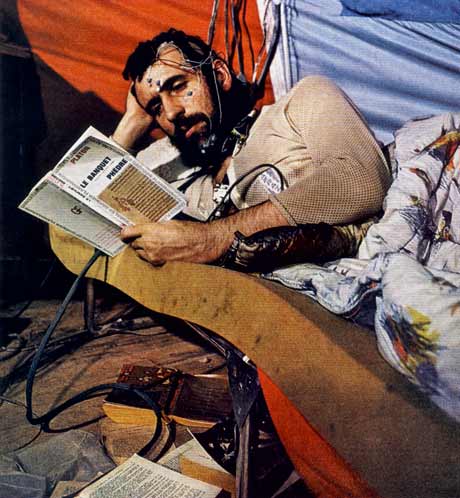Just read psychologist Adam Alter’s 2013 book, Drunk Tank Pink, which I really enjoyed even if some of the historical material he presents is well-worn. (Oh, and even though I think the connection the author draws between Usain Bolt’s surname and his career success is overstated. Jamaican steering committees responded to those fast-twitch leg muscles and stop-watch times, not his thunderous “title.”) A brief passage in the section about social isolation discusses the experience of French speleologist Michel Siffre who insinuated himself into the Space Race in the 1960s by conducting extreme self-deprivation experiments, in an attempt to anticipate how such conditions would effect astronauts. In 1962, Siffre lived within the solitude of an underground glacier to test the effect on his mental faculties. The following decade, he spent 205 days alone in a Texas cave. A Cousteau who does not get wet, Siffre has dived so deep inside of himself that time has seemed to cease.
Alter’s writing reminded me of a 2008 Cabinet interview that Joshua Foer, that memory enthusiast, conducted with the time-isolation explorer. The opening:
“Joshua Foer:
In 1962, you were just twenty-three years old. What made you decide to live underground in complete isolation for sixty-three days?
Michel Siffre:
You have to understand, I was a geologist by training. In 1961, we discovered an underground glacier in the Alps, about seventy kilometers from Nice. At first, my idea was to prepare a geological expedition, and to spend about fifteen days underground studying the glacier, but a couple of months later, I said to myself, “Well, fifteen days is not enough. I shall see nothing.” So, I decided to stay two months. And then this idea came to me—this idea that became the idea of my life. I decided to live like an animal, without a watch, in the dark, without knowing the time.
Joshua Foer:
Instead of studying caves, you ended up studying time.
Michel Siffre:
Yes, I invented a simple scientific protocol. I put a team at the entrance of the cave. I decided I would call them when I woke up, when I ate, and just before I went to sleep. My team didn’t have the right to call me, so that I wouldn’t have any idea what time it was on the outside. Without knowing it, I had created the field of human chronobiology. Long before, in 1922, it had been discovered that rats have an internal biological clock. My experiment showed that humans, like lower mammals, have a body clock as well.”
Tags: Adam Alter, Joshua Foer, Michel Siffre

